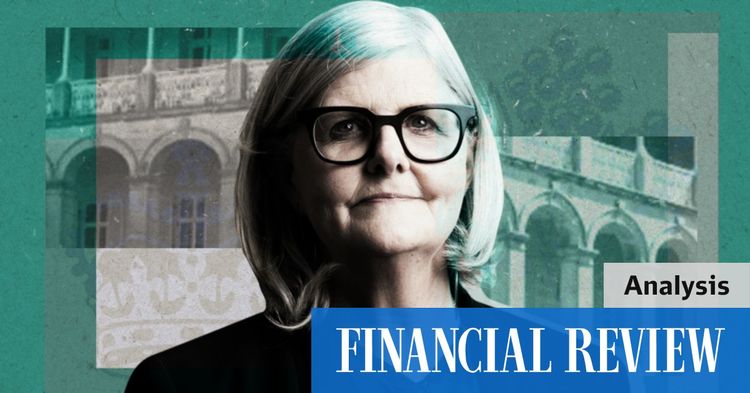Governor-General Sam Mostyn may face a constitutional crisis next ...

But she also gave weight – “in particular” – to what she called “the democratic will of the Australian people when it comes to our constitutional arrangements. It is this that will guide me in carrying out the duties of this office.”
The real meaning of these words could be tested about one year after Sam Mostyn takes up residence in Yarralumla.
According to current conventional wisdom, the theme of continuity, of the governor-general’s formal role as the British monarch’s representative in Australia, seems the most likely to prevail.
Moreover, the thrashing of the October 14 Voice to parliament referendum has effectively buried Labor’s earlier plans to hold a referendum on Australia changing to a republic if it secures a second term.
Last January, Matt Thistlethwaite, whose ministerial responsibilities include the republic issue, told the ABC: “At the moment, our priority is cost of living, and that’s the appropriate thing for the government to be concentrating on.
“We know that, unfortunately, the Voice referendum wasn’t successful, but we’re not giving up. It’s [the republic] a longer-term priority.”
However, that may not be the end of the matter. Electoral and demographic trends could combine next year to force governor-general Mostyn into a leading role in sorting out what may be Australia’s most serious constitutional crisis since Sir John Kerr, a former chief justice of NSW and governor-general from 1974-77, sacked the Gough Whitlam-led Labor government on November 11, 1975.
The symbolism is potent: 2025 will mark the 50th year since Australia’s greatest constitutional crisis. It reawakened the Australian head of state push, although the republic’s period of greatest public support was the 1990s, before the defeat of the referendum on the issue in November 1999.
It’s also worth noting that Mostyn was a onetime staff member for Labor prime minister Paul Keating, prime mover of a 1990s republic juggernaut which failed at the last hurdle.
Possible parliamentary deadlockOn the face of it, a 2025 constitutional crisis, should it occur, will have nothing to do with the British Crown, but will concern a possible parliamentary deadlock.
In a 151-member lower house, there’s at least a hypothetical post-2025-election result where the crossbench increases from, say, 16 to 17, and Labor and the Coalition win 67 seats apiece.
Factors leading to a more European parliamentary style series of minority governments in Australia depending on independent, or crossbench, support, include a global drift away from major political parties in the face of issues such as climate change and cost-of-living pressures.
It is still more than a year before the likely election, but a more plural complexion in the Australian population, plus tightening opinion polls, combined with the rise of independents and fall in the principal political parties’ vote as a percentage of the entire electorate, suggest deadlock is possible.
The closest historical comparison is 1940, when Robert Menzies led a non-Labor Coalition government with the support of two conservative independent MPs. However, the two withdrew their support in 1941 and the Coalition government collapsed.
At the time, the British governor-general of Australia, Brigadier General Alexander Gore Arkwright Hore-Ruthven, decided at the height of World War II not to order an election, and appointed the Labor leader, John Curtin, to form a government.
Any similar dilemma facing governor-general Sam Mostyn around July next year could lead to fresh questioning of the GG’s role.
“The simple fact is that she’s still the representative of the British monarch,” Geoff Gallop, a former WA Labor premier, and onetime head of the Australian Republican Movement, commented.
“Yes, she’s an outstanding choice, with her roles in the AFL [she was the first female AFL commissioner, and instrumental in the formation of the AFLW competition], with women and mental health, but it would be much better if she is the governor-general accountable to the Australian public.”
Just when the echoes from the failed 1999 republic referendum, and last October’s Voice to parliament referendum debacle, seem to have buried the republic push for decades, the twists and turns of Australian politics may generate some surprising outcomes.
This would mean that Sam Mostyn, the second female to hold the post, could be Australia’s most significant governor-general. And as Geoff Gallop says, “Every time she opens her mouth, people listen.”
According to independent MP Zali Steggall, Mostyn will be a “sound and balanced voice”.

























































